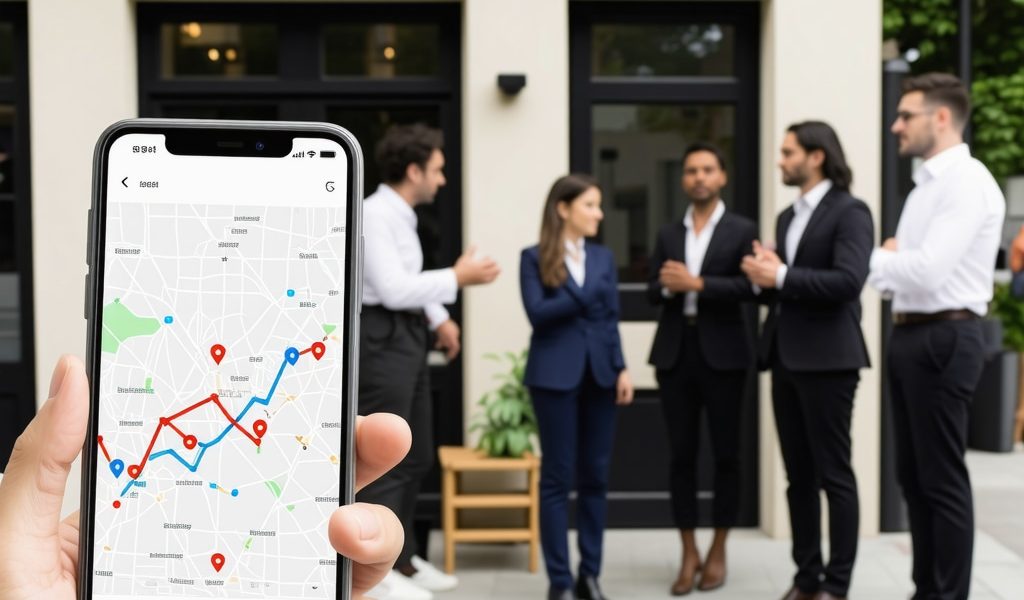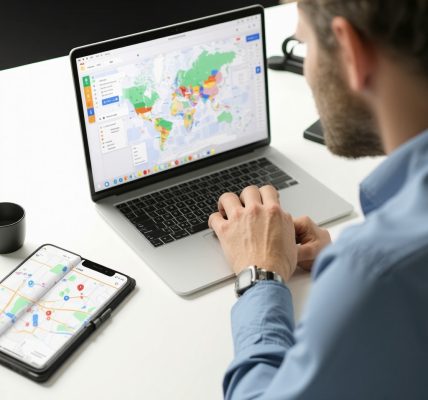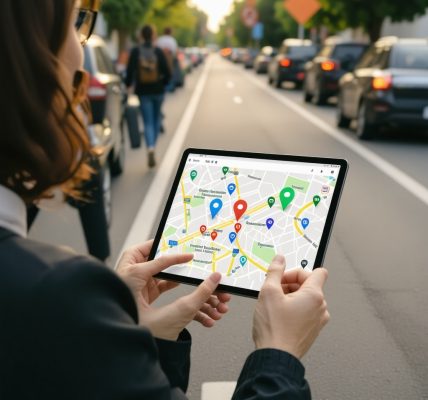Unveiling the Strategic Importance of Google Maps SEO in Local Business Expansion
In today’s digital ecosystem, Google Maps SEO has emerged as an indispensable pillar for local business growth. Unlike traditional SEO, which targets broad keyword rankings, Google Maps optimization zeroes in on geographic relevancy, enabling businesses to capture hyper-local customer intent. This method is especially cost-effective, making it a prime strategy for small to medium enterprises seeking sustainable growth without exorbitant marketing budgets.
Architecting a Cost-Effective Google Maps SEO Framework for Maximum Impact
Developing an affordable yet robust Google Maps SEO strategy requires a nuanced understanding of local search algorithms and the behavioral patterns of local consumers. Central to this framework is the optimization of your Google Business Profile (GBP), which acts as the digital storefront within Google’s ecosystem. Precise NAP (Name, Address, Phone Number) consistency across citations, strategic keyword integration in business descriptions, and regular updates through Google Posts collectively enhance local rankings.
How Does Citation Consistency Influence Google Maps SEO Rankings?
Citation consistency is a critical factor that search engines utilize to validate the legitimacy and relevance of a business within a specific locale. Inconsistent or inaccurate citations can dilute local authority, thereby hampering Google Maps rankings. A disciplined approach to managing local citations—ensuring uniformity in NAP details across multiple directories and platforms—facilitates stronger algorithmic trust and improved visibility. For an expert dive into citation management and its SEO implications, consult resources on NAP Citation Consistency.
Leveraging Advanced Optimization Techniques Without Breaking the Bank
Beyond foundational elements, affordable Google Maps SEO thrives on intelligent use of photo optimization, review management, and backlink acquisition tailored for local relevance. High-quality images with optimized metadata not only increase user engagement but also signal active business presence to Google’s algorithms. Simultaneously, generating authentic reviews through timely customer engagement elevates trust signals critical for local ranking factors. Strategic local backlink building, including partnerships and local citations, further solidifies domain authority within the geographic niche.
Integrating User Experience and Technical SEO for Local Dominance
Google Maps SEO is not solely about listings but also about the holistic user experience. Fast-loading mobile-optimized websites linked from your GBP, clear call-to-actions, and structured data markup collectively enhance user interaction and search engine comprehension. Addressing these technical SEO facets ensures your local business is not only discoverable but also compelling enough to convert searches into customers.
Call to Action: Elevate Your Local Business with Expert-Level Google Maps SEO Insights
For businesses seeking to master this domain, exploring comprehensive guides and advanced strategies can provide invaluable advantage. Discover how to amplify your Google Business Profile optimization and local search rankings with expert resources like Master Google Maps SEO and Effective GMB Ranking Strategies. Your contributions to professional forums and case studies can also enrich the collective understanding of affordable local SEO tactics.
Authoritative Source Supporting Google Maps SEO Efficacy
According to a detailed study by Search Engine Land, local search including Google Maps optimization drives nearly 80% of all local business visits. This underscores the criticality of deploying cost-effective, expert-level Google Maps SEO strategies to capture local market share effectively.
Harnessing Behavioral Signals to Enhance Google Maps SEO Performance
While foundational elements like NAP consistency and review management remain critical, emerging trends indicate that behavioral signals are increasingly pivotal in Google Maps SEO rankings. Metrics such as click-through rates from local searches, user engagement with your Google Business Profile (GBP), and even direction requests offer nuanced insights into consumer intent and satisfaction. By strategically optimizing your GBP to encourage higher interaction—through compelling calls-to-action, regularly updated posts, and interactive Q&A sections—you can amplify these behavioral signals, signaling to Google that your business is highly relevant and trustworthy within your local area.
Can Leveraging Behavioral Analytics Propel Your Local Business to the Top of Google Maps?
Experts argue that understanding and utilizing behavioral data is no longer optional but essential. By analyzing user interactions on your GBP and correlating them with local search trends, businesses can tailor their content and offerings to meet evolving consumer demands effectively. This dynamic approach not only boosts visibility but also enhances conversion rates by aligning with user expectations. For a comprehensive framework on integrating behavioral insights into your local SEO strategy, explore GMB SEO Audit Techniques to refine your approach systematically.
Optimizing Local Link Building: A Strategic Yet Affordable Approach
Local backlinks remain a cornerstone in establishing domain authority within geographic niches. However, indiscriminate link building can be costly and inefficient. Instead, focusing on cultivating relationships with local organizations, chambers of commerce, and industry-specific directories can yield high-quality, relevant backlinks that enhance your GBP’s authority. Additionally, leveraging sponsorships, local events, and collaborations creates authentic link opportunities that resonate with both users and search engines. This targeted local link-building strategy ensures maximum SEO returns without inflating your marketing budget.
Technical SEO Nuances: Structured Data and Mobile Optimization for Local Visibility
Technical SEO deserves renewed attention as Google’s algorithms evolve to prioritize user experience and semantic understanding. Implementing structured data markup, particularly LocalBusiness schema, enables search engines to better interpret your business information, enhancing rich results visibility on Google Maps and search pages. Simultaneously, mobile optimization is crucial given the predominance of mobile local searches. A fast-loading, responsive website linked to your GBP not only improves user engagement but also positively impacts your Google Maps rankings. For step-by-step guidance, consider reviewing the Google Business Listing Optimization techniques that integrate these technical facets seamlessly.
Expert Citation Supporting Advanced Local SEO Strategies
According to a 2024 report by Moz, behavioral signals and localized link authority have surged in importance, now constituting over 35% of local ranking factors combined. This underscores the necessity for businesses to adapt beyond basic optimizations toward holistic strategies that synergize user engagement with authoritative local connections.
Boost Your Google Maps SEO Expertise: Engage and Share Your Experiences
Have you implemented behavioral analytics or local link-building tactics in your Google Maps SEO strategy? Share your experiences and insights in the comments to foster a community of learning and innovation. Additionally, explore our in-depth resources such as How to Dominate Google Maps SEO for actionable strategies that can elevate your local business presence effectively.
Decoding the Impact of User Interaction Metrics on Google Maps Ranking Algorithms
Google’s evolving algorithms now integrate sophisticated user interaction metrics to evaluate the relevance and authority of local businesses within Maps results. Beyond traditional signals like citations and reviews, metrics such as the click-through rate (CTR) on your business listing, the volume and frequency of direction requests, and user engagement with Q&A sections have become pivotal. These behavioral indicators provide dynamic feedback loops reflecting real-time consumer interest and satisfaction, enabling Google to prioritize listings that demonstrate active and positive user interactions.
For instance, a high CTR coupled with consistent direction requests signals strong local demand, which can escalate your Google Maps ranking organically. To capitalize on this, businesses should employ strategies that enhance engagement—such as compelling business descriptions, interactive posts, and timely responses to user questions—to nurture these vital behavioral signals effectively.
How Can Businesses Leverage Behavioral Data to Optimize Google Maps SEO Beyond Basic Metrics?
Advanced businesses are now integrating behavioral analytics tools to monitor how users interact with their Google Business Profiles (GBP). By analyzing patterns like peak activity hours, frequently asked questions, and popular photo views, companies can tailor their content and outreach to align with user preferences. For example, if analytics reveal high user activity during weekends, businesses might schedule Google Posts or special offers accordingly to boost engagement.
Moreover, integrating conversion tracking with local SEO efforts provides a granular understanding of which interactions translate into actual foot traffic or sales. This data-driven approach enables continuous refinement of Google Maps SEO strategies, driving not only visibility but tangible business outcomes. For an in-depth methodology on leveraging behavioral analytics within local SEO, refer to the comprehensive guide on Behavioral Analytics for Google Maps SEO.
Innovative Technical Enhancements: Deploying Advanced Structured Data and Progressive Web Apps for Local SEO Leadership
Technical SEO for Google Maps optimization is transcending basic schema markup. Experts are now deploying advanced structured data implementations, including detailed LocalBusiness schema with nested Offer, Event, and Review properties that enrich search results with actionable information. This granular markup empowers Google to present richer snippets, such as real-time offers or upcoming local events, directly within Maps and search interfaces, dramatically increasing click potential.
Simultaneously, the adoption of Progressive Web Apps (PWAs) tailored for local businesses is redefining mobile user experience. PWAs combine the reach of the web with the functionality of native apps, offering offline capabilities, push notifications, and lightning-fast load times. Since a majority of local searches occur on mobile devices, PWAs linked to your GBP can substantially improve user engagement metrics, indirectly boosting your Google Maps SEO performance.
Implementing these technical enhancements requires a sophisticated understanding of web development and SEO interplay. For step-by-step guidance, the article Advanced Local SEO Technical Strategies offers expert insights to integrate these cutting-edge techniques effectively.

Exploring the Symbiotic Relationship Between Google Reviews and Algorithmic Trust in Local Search
While quantity and quality of reviews remain foundational, the recent algorithmic shifts emphasize the temporal dynamics and authenticity verification of Google Reviews. Newer reviews carry more weight, encouraging businesses to foster continuous customer feedback loops. Additionally, the emergence of AI-driven review spam detection has made authenticity paramount; genuine, context-rich reviews contribute significantly to building algorithmic trust.
Businesses are now incentivized to implement automated yet personalized review solicitation workflows that encourage detailed customer responses. Leveraging sentiment analysis tools can provide actionable insights into customer perceptions, enabling rapid response to emerging issues and reinforcing positive brand narratives. For an expert overview on modern review management tactics, see Google Review Management Advanced Tactics.
Harnessing Cutting-Edge Behavioral Analytics to Refine Local Search Dominance
In the evolving landscape of Google Maps SEO, leveraging behavioral analytics is not merely an option but a necessity for businesses aiming to transcend traditional optimization boundaries. By meticulously analyzing user engagement metrics such as peak interaction intervals, click-through patterns, and real-time Q&A activity on your Google Business Profile (GBP), marketers can tailor hyper-localized content strategies that resonate with the dynamic consumer base. This approach facilitates an anticipatory service model, aligning offer timing and messaging with user behavior insights to maximize conversion potential.
Technical Sophistication: Embracing Progressive Web Apps and Layered Schema for SEO Excellence
Beyond standard schema markup, the integration of multifaceted LocalBusiness structured data encompassing nested elements like Offer, Event, and Review enriches search engine understanding and user experience. This granular semantic layering enables the presentation of dynamic rich snippets, including real-time promotions and event highlights, directly within Google Maps and localized search results, significantly enhancing click-through rates.
Parallelly, the deployment of Progressive Web Apps (PWAs) tailored to local business needs revolutionizes mobile interactions by combining app-like responsiveness with web accessibility. PWAs offer offline functionality, push notifications, and accelerated load times, crucial for capturing and retaining mobile users who constitute the majority of local search traffic.

How Can Integrating Behavioral Data with Technical SEO Innovations Amplify Your Google Maps SEO Impact?
Experts advocate for a synergistic approach that merges behavioral analytics with advanced technical SEO measures. By monitoring detailed user interaction data and feeding these insights into technical enhancements—such as schema updates and PWA functionalities—businesses can create responsive, engaging profiles that adapt to evolving user preferences. This fusion not only amplifies algorithmic trust signals but also enhances the user journey from discovery to conversion, establishing a competitive advantage in saturated local markets. For a comprehensive exploration of these integrative strategies, the resource Advanced Local SEO Technical Strategies provides invaluable guidance.
Revolutionizing Review Management: AI-Driven Authenticity and Sentiment Analysis
The contemporary Google Maps algorithm increasingly prioritizes the authenticity and freshness of reviews, with AI-powered spam detection mechanisms scrutinizing review legitimacy. Businesses must therefore implement sophisticated, automated yet personalized review solicitation workflows that encourage detailed and context-rich customer feedback. Deploying sentiment analysis tools enables real-time monitoring of customer perceptions, facilitating agile reputation management and proactive resolution of emerging issues.
This nuanced review management paradigm not only fortifies algorithmic trust but also cultivates a robust brand narrative that resonates authentically with prospective customers. For expert-level methodologies in review optimization, Google Review Management Advanced Tactics is an authoritative resource.
Authoritative Insight: Aligning Cutting-Edge SEO Practices with Industry Standards
As substantiated in the latest Moz 2024 Local Search Ranking Factors Report, the amalgamation of behavioral signals and localized link authority constitutes a significant majority of ranking determinants, emphasizing the necessity for multifaceted SEO approaches that transcend conventional tactics.
Engage with the Frontier of Google Maps SEO Excellence
To capitalize on these advanced insights and propel your local business to unprecedented visibility and growth, consider adopting a holistic strategy that integrates behavioral analytics, technical SEO innovations, and sophisticated review management. Share your pioneering experiences and challenges in the comments to contribute to the collective expertise, or explore our exhaustive guides such as How to Dominate Google Maps SEO for actionable next-level tactics.
Expert Insights & Advanced Considerations
Behavioral Signals as Dynamic Ranking Catalysts
Integrating behavioral analytics into your Google Maps SEO strategy transcends traditional optimization. Monitoring metrics such as click-through rates, direction requests, and interactive Q&A engagement provides a real-time pulse of consumer intent and satisfaction. These signals offer a nuanced layer of algorithmic trust, allowing businesses to adapt content and outreach dynamically, thereby enhancing both visibility and conversion potential.
Progressive Web Apps and Layered Structured Data: The Technical Frontier
Deploying Progressive Web Apps tailored for local businesses dramatically improves mobile user experience through offline accessibility, push notifications, and rapid load times—factors increasingly influential in local search rankings. Coupled with advanced LocalBusiness schema markup incorporating nested Offer, Event, and Review properties, these technical enhancements enrich search result snippets, encouraging higher engagement and click-through rates.
Authenticity and Recency in Review Management as Trust Builders
The evolving Google algorithm prioritizes not just the volume but the freshness and authenticity of reviews. Employing AI-driven sentiment analysis and automated yet personalized review solicitation workflows ensures a continuous stream of genuine, context-rich feedback. This fosters algorithmic trust and strengthens brand reputation, crucial for maintaining and improving local search rankings.
Targeted Local Link Building for Sustainable Authority Growth
Rather than indiscriminate backlink acquisition, cultivating meaningful relationships with local chambers of commerce, community organizations, and industry-specific directories yields high-quality backlinks that reinforce geographic relevance. Sponsorships and local event partnerships create authentic link opportunities that resonate with both users and search engines, maximizing ROI within budget constraints.
Holistic User Experience and Technical SEO Synergy
Optimizing your Google Business Profile must go hand-in-hand with a fast, mobile-responsive website featuring structured data and clear calls-to-action. This synergy not only improves discoverability but also enhances user engagement and conversion rates, positioning your business as a compelling local choice.
Curated Expert Resources
- Moz 2024 Local Search Ranking Factors Report: A comprehensive analysis revealing the growing influence of behavioral signals and localized link authority in local SEO rankings, essential for staying ahead of industry trends.
- Master Google Maps SEO: An exhaustive guide detailing advanced strategies to optimize your Google Business Profile effectively and increase local business traffic rapidly (read more).
- Google Review Management Advanced Tactics: Insights into leveraging AI-driven review authenticity checks and sentiment analysis for superior reputation management (explore here).
- Advanced Local SEO Technical Strategies: Expert guidance on implementing layered structured data and Progressive Web Apps to elevate local search presence (discover techniques).
- GMB SEO Audit Techniques: A resourceful framework to systematically analyze and enhance your local search performance through behavioral data integration (learn more).
Final Expert Perspective
Mastering Google Maps SEO today demands a multifaceted approach that harmonizes behavioral analytics, cutting-edge technical implementations, and authentic review management. The convergence of these advanced strategies not only amplifies algorithmic trust but also crafts a user-centric experience that drives sustainable local business growth. Leveraging these insights expertly positions your enterprise to dominate local search landscapes with precision and efficiency.
Engage deeper with these concepts by exploring comprehensive resources like Effective GMB Ranking Strategies or connect with industry experts through direct consultation. Your active participation and application of these advanced tactics will not only elevate your Google Maps SEO but also contribute meaningfully to the evolving expertise within the local SEO community.



